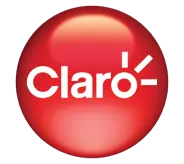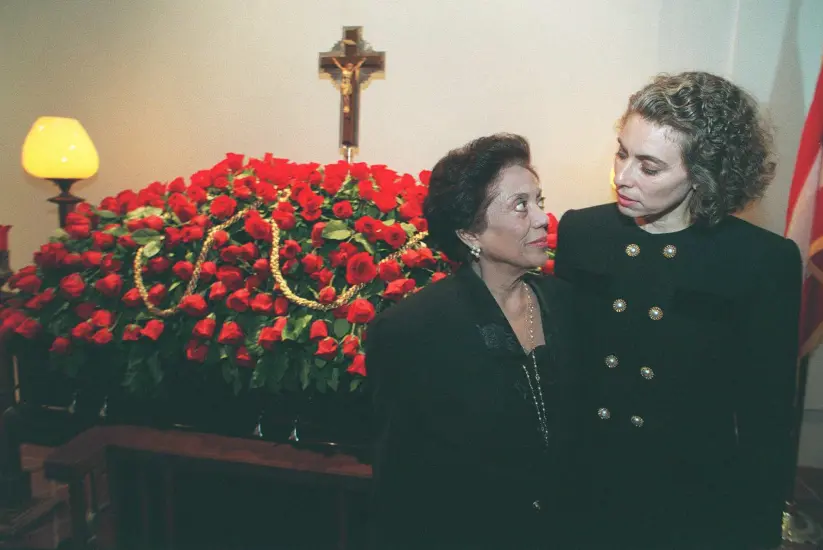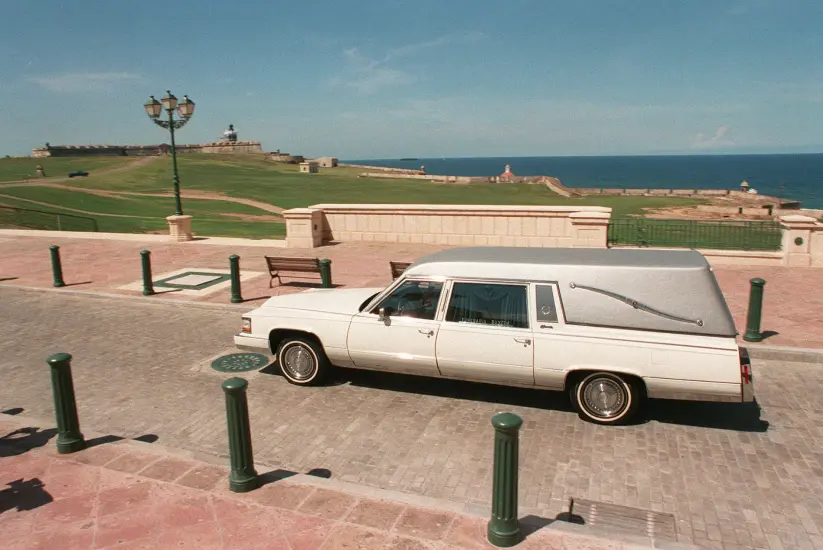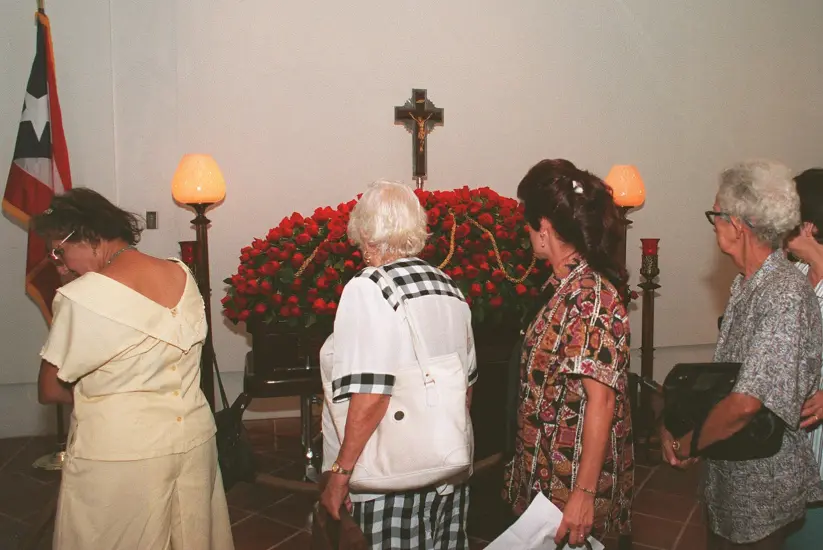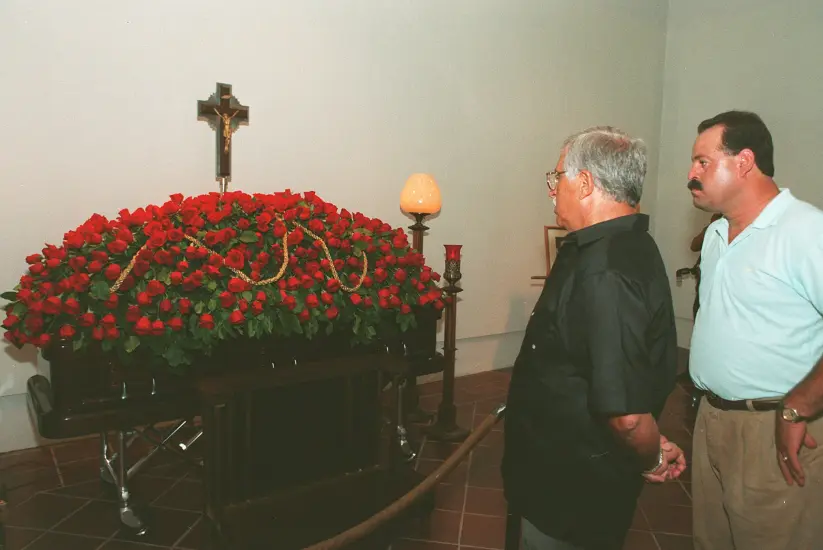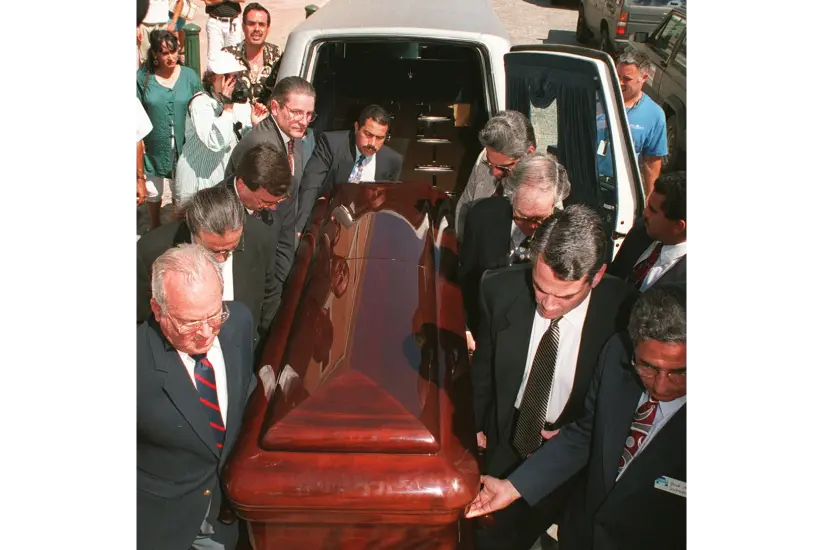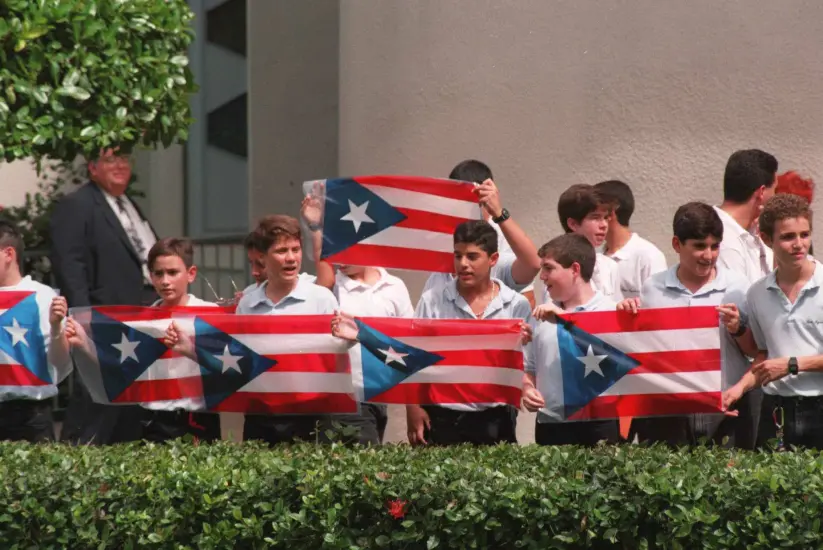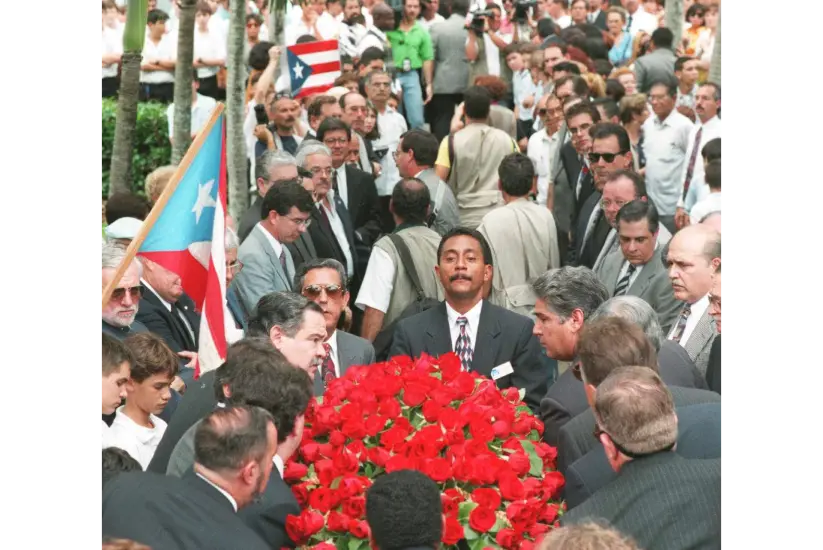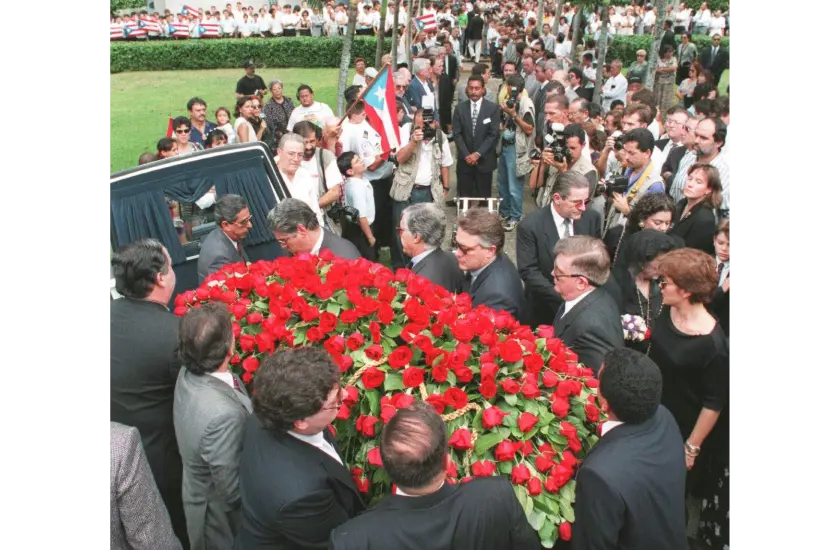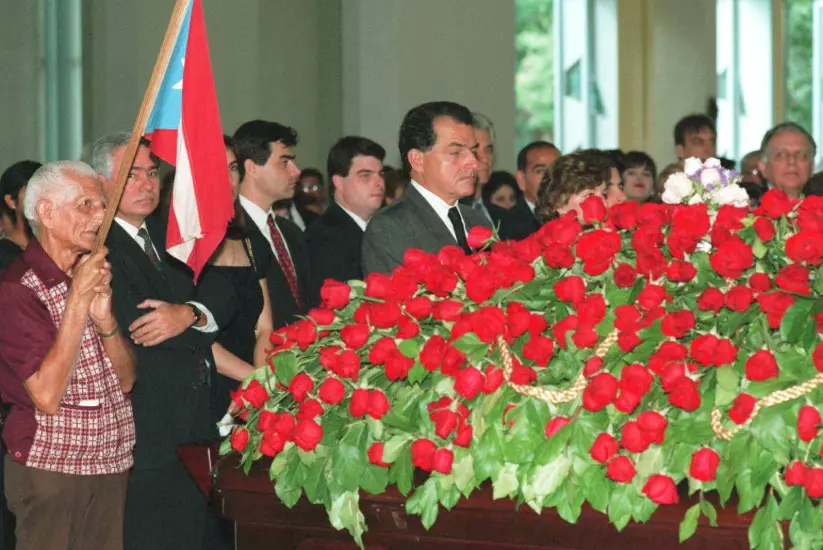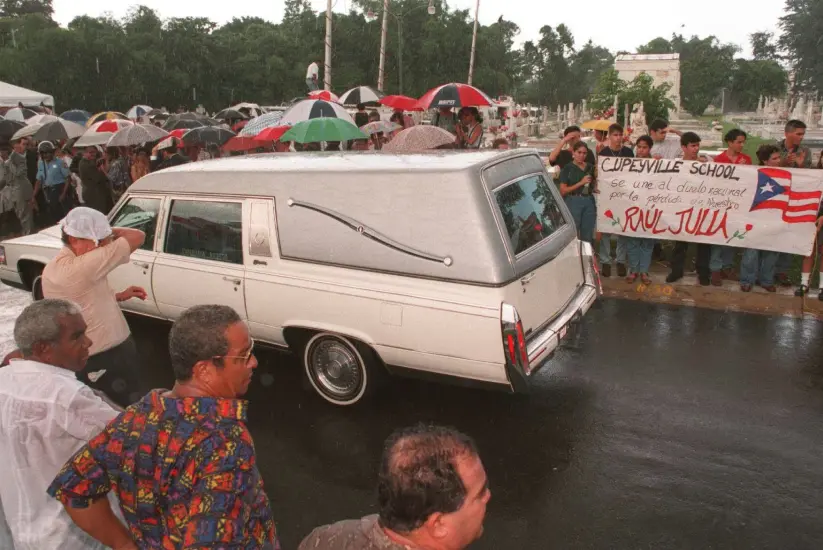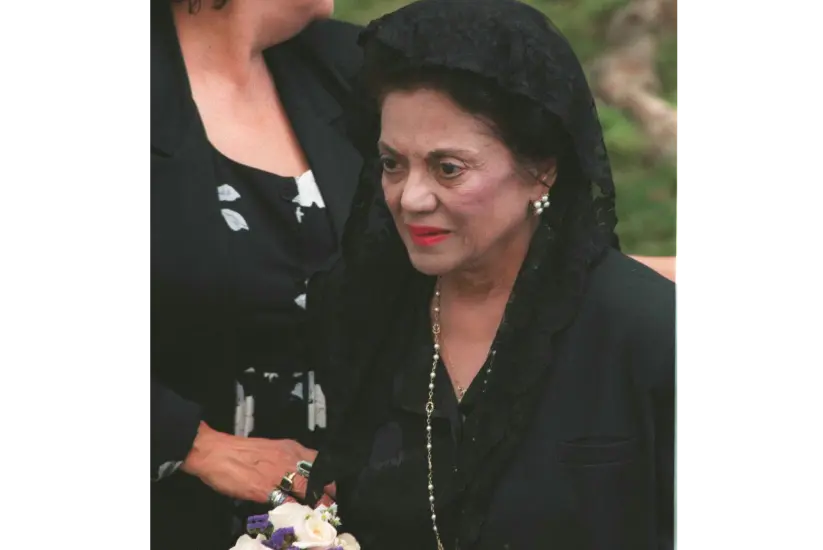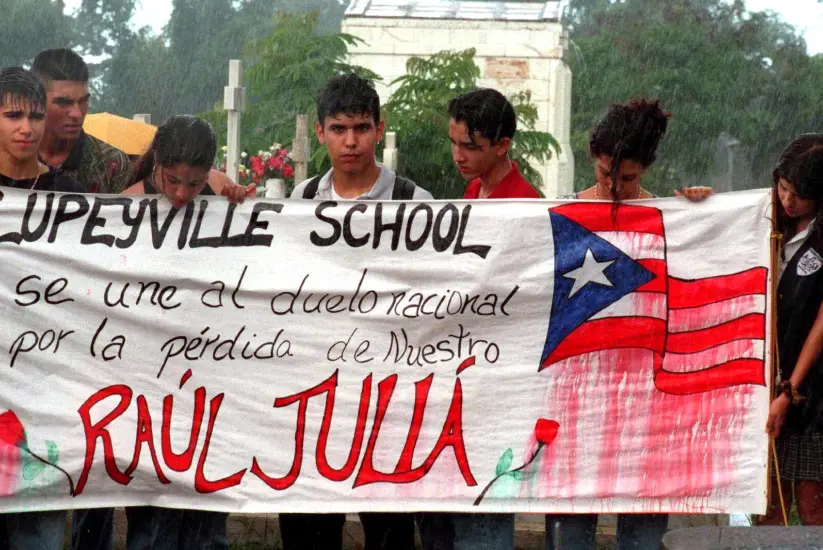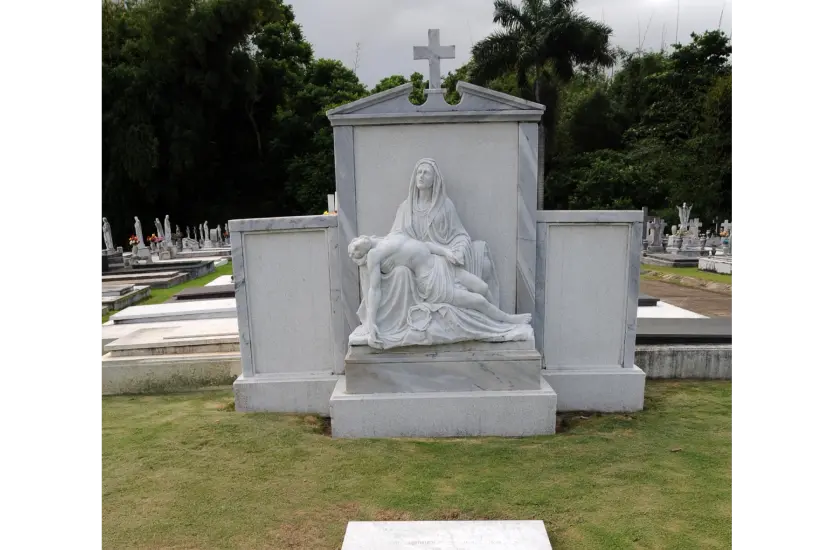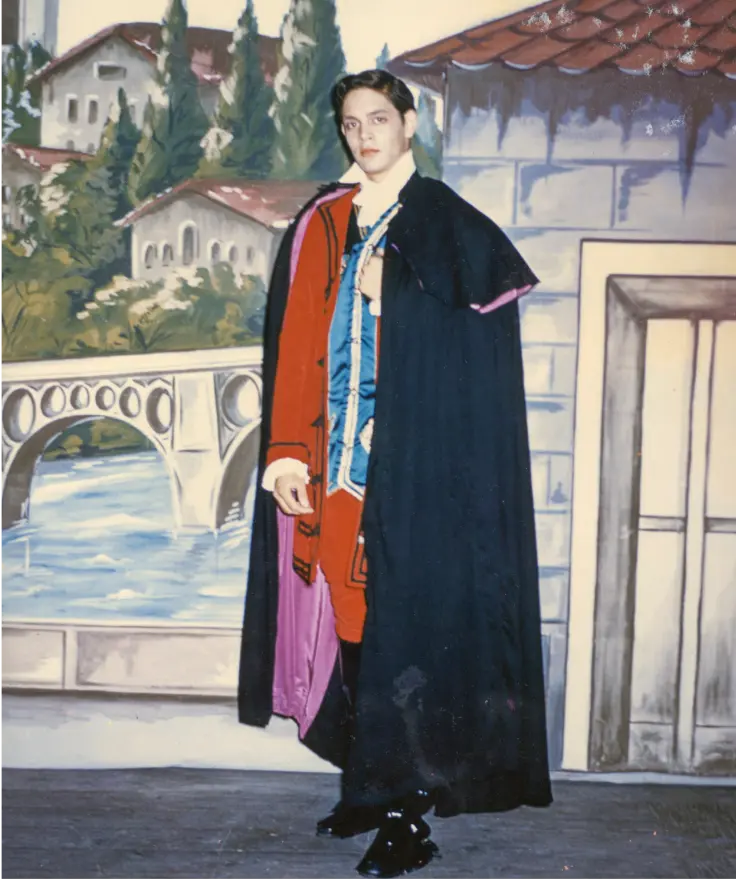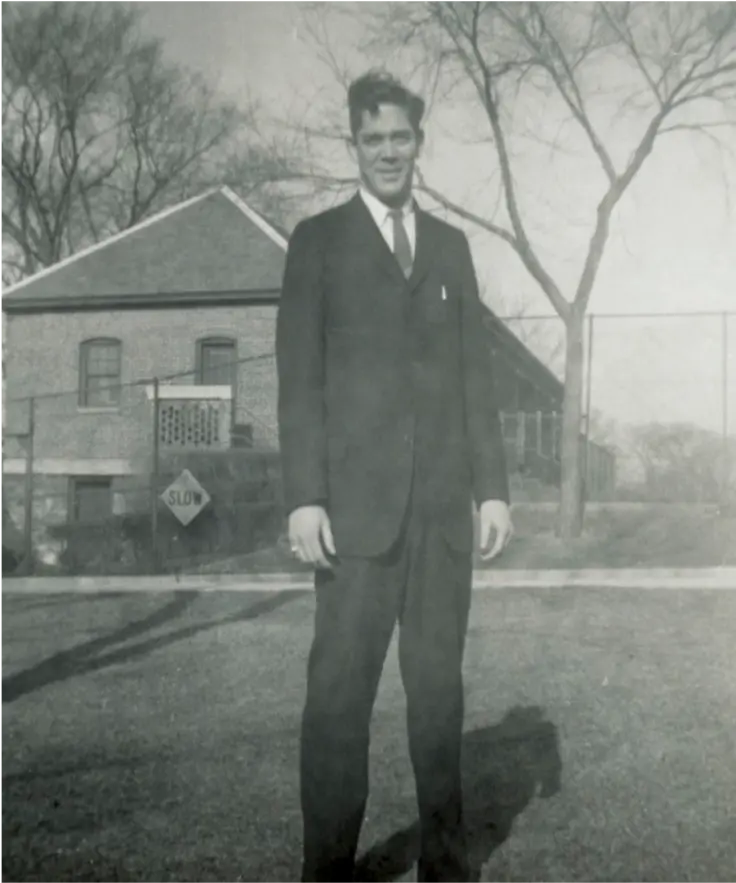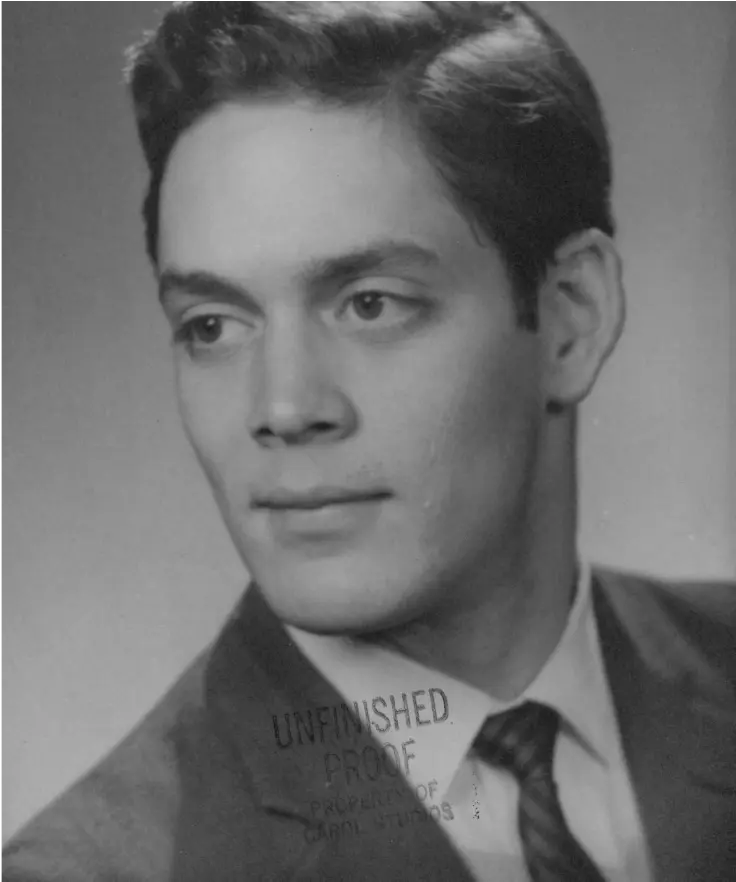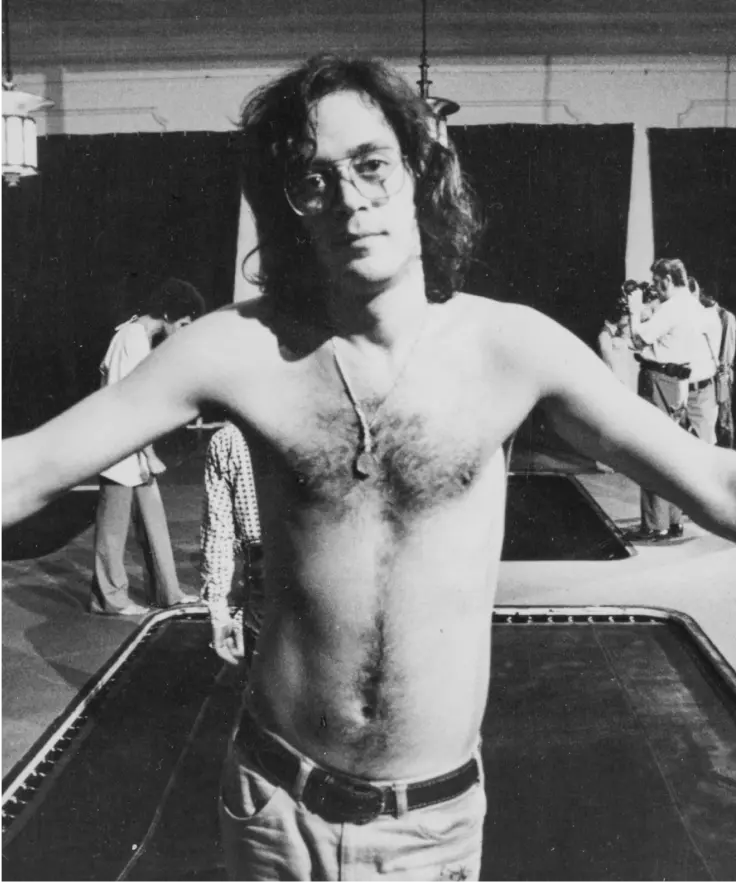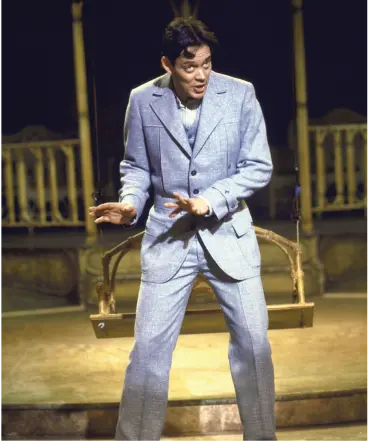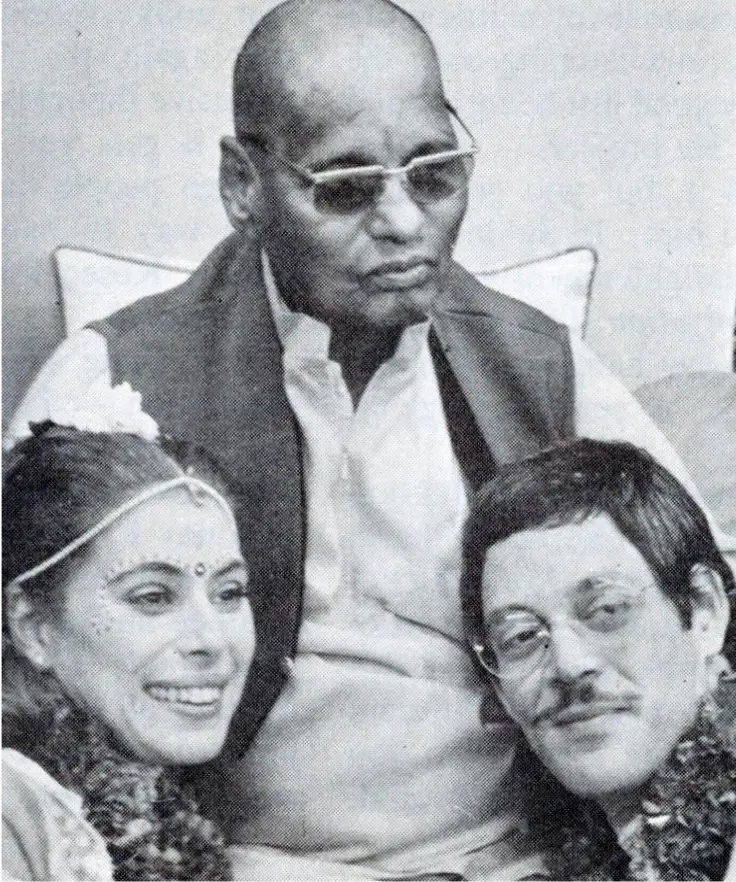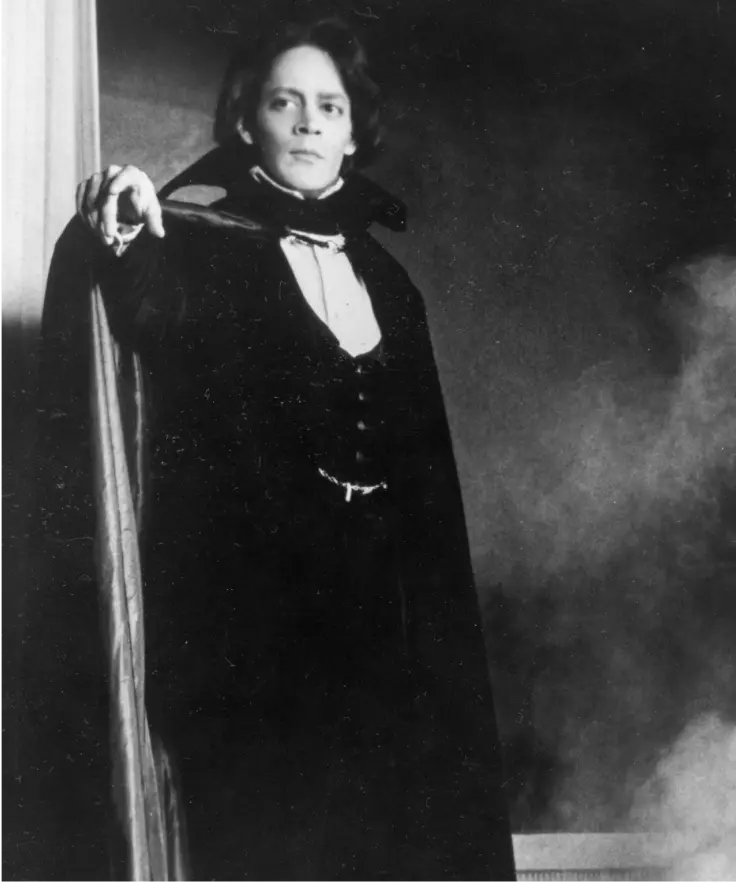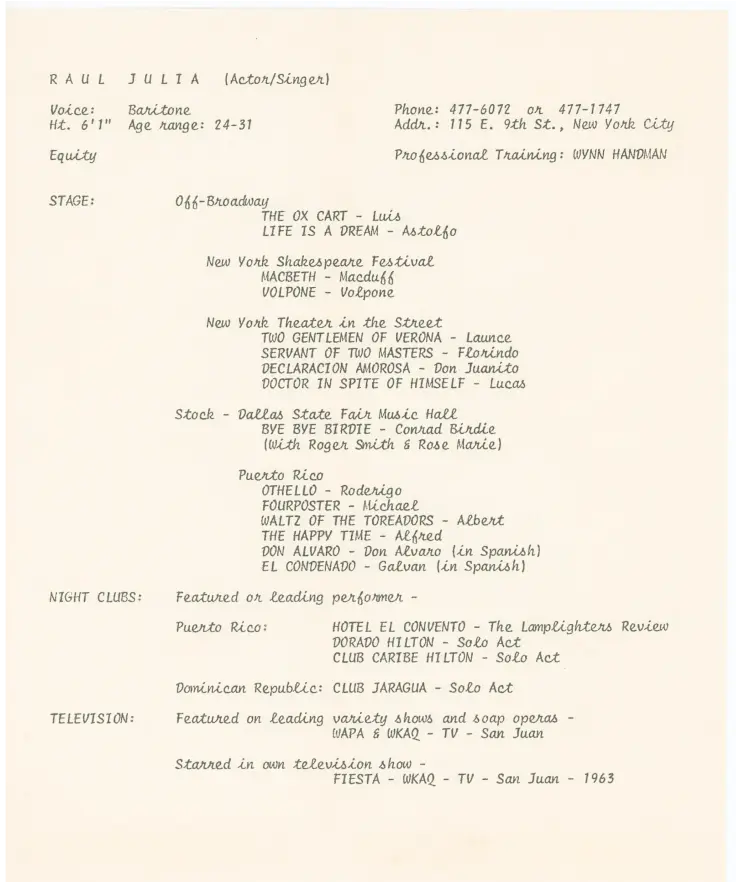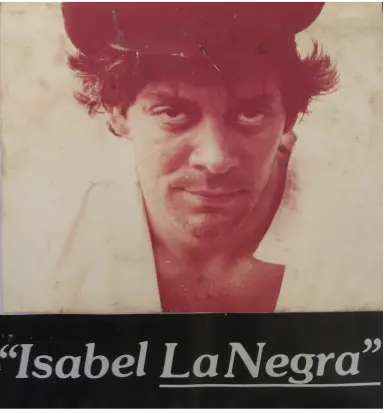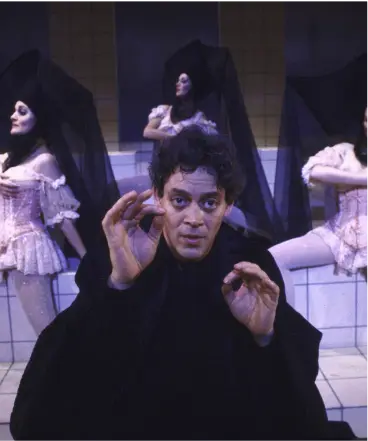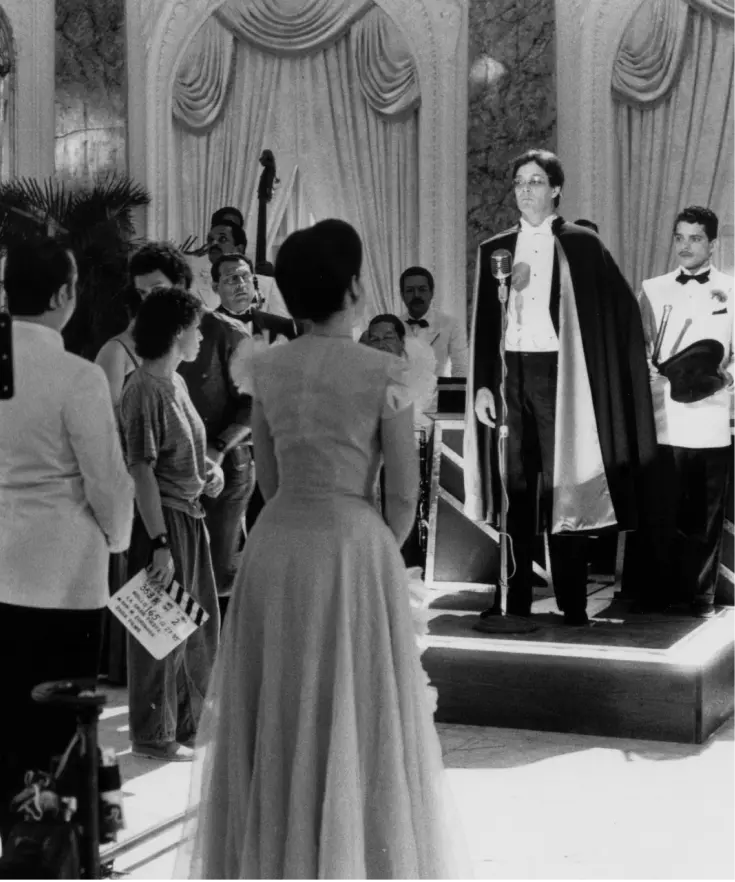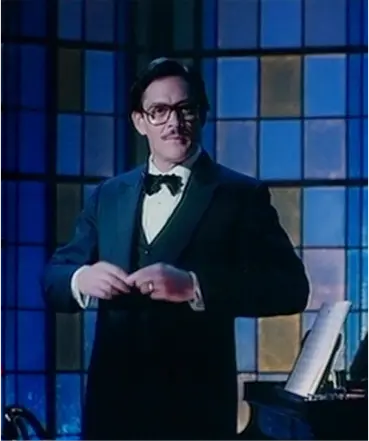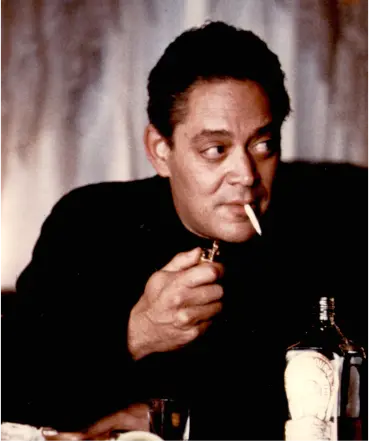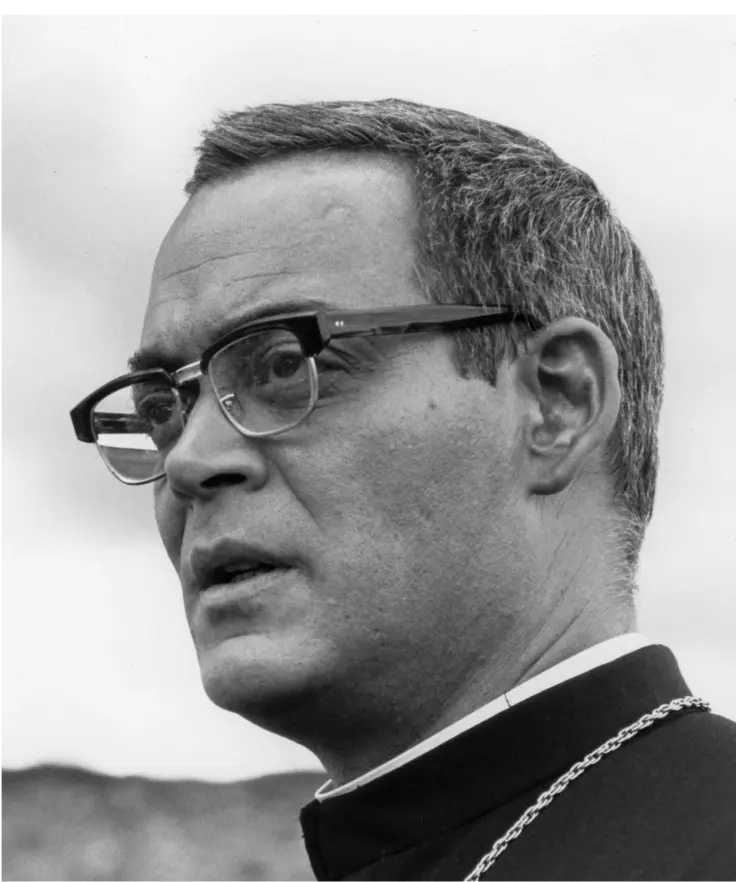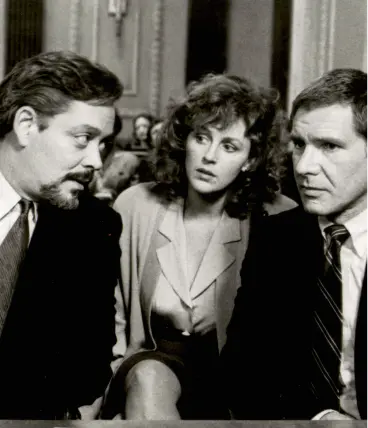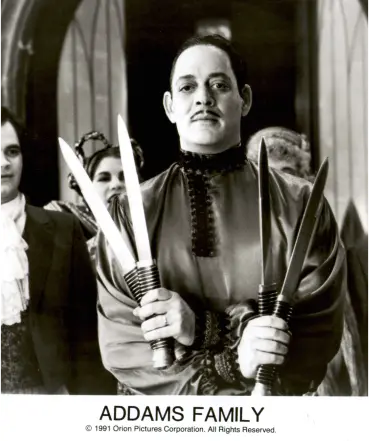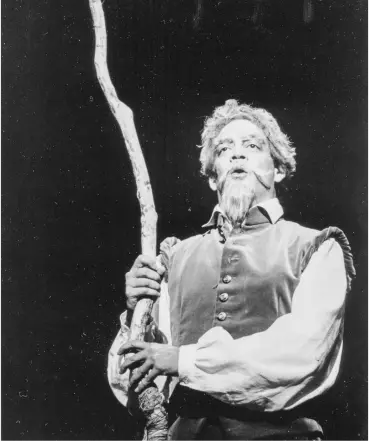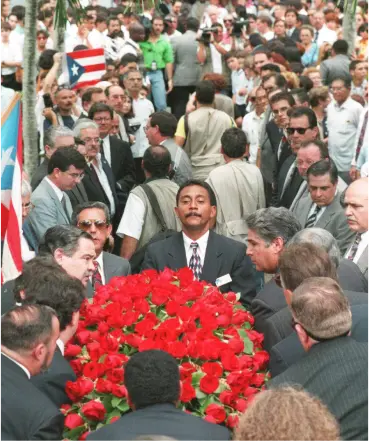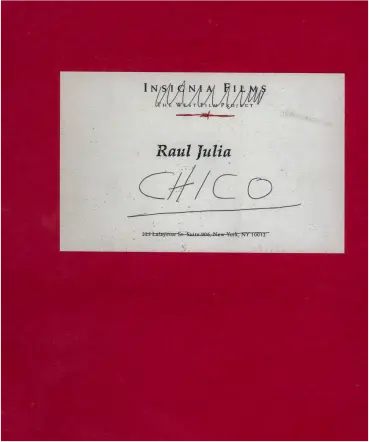It was a rainy day. Countless souls sheltered under umbrellas, newspapers, and capes while the coffin was carried to the carriage for its final ride. It was then when the voice of Lucecita Benítez burst into the air to sing the verses of the homeland that Raúl Juliá loved with all his being during his lifetime.
“The land of Borinquen, where I was born...” There are few sources of information about what happened on that day, but it is not hard to imagine the tears flowing from the hundreds of people who witnessed the moment.
The procession left Old San Juan and made its first stop at the Colegio San Ignacio de Loyola, in Río Piedras. Among the memories it is mentioned that as the caravan crossed the streets, people came out of their homes and jobs with flowers in hand and signs professing love for a man who was much more than an actor. It is also said that more than a thousand people came to the church, located just steps from the school, where Father Juan Santiago, then principal, asked that Juliá be given a farewell in a way that honored his acting work.
“Let's say goodbye to Raulito with applause, as we would do in the theater,” said the religious man. His call was reciprocated by an ovation of more than two minutes.
“He knew that I loved him, that I adored him.”
On the 30th anniversary of her brother's death, María Eugenia recalls their most cherished memories. A 15-year age difference separated them, which, in practical terms, amounts to a lifetime. Despite this, the details of what they did share remain vivid in her mind. The moments come and go, somewhat disorganized, but they are there.
“We were four siblings, we lived in a big house in Condado, on Santiago Iglesias Street. Raúl was the first grandson on both sides, for the Juliá family and for the Arcelay family. So, he was always like a prince, and he knew it. And he would tell me, 'I'm the favorite, I'm sorry,' he was the first of all,” she recalls.
She was just a child, so the anecdotes about her brother's time at Colegio San Ignacio come secondhand. The same with some of the harder parts of the story, such as the death of her other brother, Rafa, in a car accident when he was only 16 years old. They tell him that it was a very hard blow for Raúl, who at the time was studying at Fordham University in New York.

Rather than things that were said during that time period, her memory goes back to the peculiar things Raúl did during his time in the house.
“I remember he always sang at home,” she says. “I was little and, if you wanted to watch TV, he wouldn't let you because he was singing. He was always singing, he was always singing in his room when he was in Puerto Rico,” she explains with a laugh.
“Everybody loved him. It's not because he was my brother, but he was handsome. All the girls, when we came home from school in the bus, would jump out the window to see him. He was a completely normal boy, a very nice person. I always said it, since he died: he was a better person than an actor, and he was a good actor,” she recalls.
Despite these childhood vignettes, their sibling relationship was established, rather, in adulthood. Already at this stage of their lives, María Eugenia, her other sister, Olga, and Raúl himself were forging their lives outside of Puerto Rico, although they remained very connected to their roots.
“I really met him when I was already living in Spain, I was already in college, but he traveled a lot. He always stopped in Madrid, with Merel, my sister-in-law,” she says.
The final days of her brother María Eugenia are also very fresh in her memory.

“He chose not to tell anyone that he had cancer. They said terrible things about him. He chose that, he also chose not to treat himself. He lasted as long as he wanted to last. During his last days, I never saw him complaining. In Mexico he got sick and they brought him to me, and I had him in the hospital. I would tell you that I remember him very thin. An impressive thing. It wasn't him, but, anyway, he was calm. He knew, more or less, he had been preparing for three years. He never thought that death was going to come so soon,” she stresses. Death came while he was in a hospital in New York on October 24, 1994. He was 54 years old.
Despite her brother's long career, perhaps due to their close relationship, María Eugenia says that neither she nor her sister had a very clear idea of Raúl's fame. To them, he was simply their older brother who had gone to the United States to pursue a career. But to the rest of the world, Raúl was a star. The magnitude of his figure became evident at the time of his death, when thousands of people paid tribute to him. In this, perhaps, the family found unexpected solace.
—Do you have anything you would like to say to your brother that you couldn't say to him in life?
“Maybe that he went too fast. But I will catch him up there. Beyond that, he knew that I loved him, that I adored him, and he knew he could count on me anytime.”
A unique vibe and talent
Connected to a virtual phone call from some corner of Ireland, where he is currently filming the second season of the series in which he plays the patriarch of the strange and beloved Addams family, -a role previously popularized by Juliá himself - Luis Guzmán reflects on the life of the man who, in a way, paved the way for other actors like him to also achieve success.
“I got to know Raúl a bit towards the end of his life, when he was already ill. I had the opportunity to talk to him because he was working on a film, ‘The Burning Season’. I got to meet him at the premiere. The love that Raúl had, his vibe, that touched me a lot. Raúl was different, he was the kind of actor that whatever role he played, he made it very special. I always knew he was a good person, a person and a talented actor. I was watching him in the film, and I said, 'Wow, that was a sincere work'. At that moment when I had the opportunity to talk to him, the man gave me a hug and a big hug. And I never forgot that moment,” he says, then pauses.
“The most important thing is that an actor, a musician, a poet, a writer never forgets where he comes from and that he has to give back to the next generation,” he explains.
Perhaps no one did it better than Raúl Juliá.
The Unfinished Task
When the computer camera was turned on to talk to veteran actor Edward James Olmos, the first thing that jumped out was that, on a wall in the living room of his Los Angeles residence, hung a sizable photo of Raúl Juliá. A slow, reflective tone came into his voice as he reminisced about his Puerto Rican colleague.

“Every single day of my life I see him and talk to him; I see it as therapy. It has been 30 difficult years. An extraordinary human being, with a great sense of commitment to art and humanity. For me, there are only two or three actors who possess the same level of talent as Raúl Juliá, especially when interpreting the classics: José Ferrer, Anthony Quinn and Rita Moreno. Raúl had the ability to transcend in a very organic way. He was able to bring the audience closer to the most complex or distant characters of our daily lives or of our times. From Shakespeare to 'The Addams Family' he was so great. The most complete performer I've ever seen. When he started doing Shakespeare in a Puerto Rican accent, he got into our hearts; we understood the universality of the text,” he said.
When they acted in the film “The Burning Season,” they were already friends, along with filmmaker Marcos Zurinaga. The trio met frequently to have lunch and to shape several projects. That's why, although they were aware of his health condition, his death was a very hard blow that gave way to a mixture of feelings.
“I was very sad, but at the same time I was angry because I felt he left us too early; we wanted to do so many things together, so many plans,” he says. Among those plans was to travel to Puerto Rico.
“We had talked about me going to see Puerto Rico with him. But work, the commitments of each of us prevented it. So, the first time I visited the island was to accompany him. I traveled on the same flight in which his coffin was carried and I went down to the runway to be there when they unloaded and transported him. Then to see the demonstrations of love from the public, his friends and family. It's something I'll never forget,” Olmos recounts with nostalgia.
“He had a gift for communicating the essence of the human being in his characters, and at the same time he had a genuine and personal concern for humanity, for fighting world hunger. It was that sense of giving more than you get. He was very noble with people. He would talk to everybody on the street, wherever he was stopped. He understood what he meant, what he represented to the people who came to greet him. He taught me a lot of things,” he says.
A major talent on stage
Daniel Lugo remembers very well his days working on the iconic movie “La gran fiesta”, a purely Puerto Rican film in which Juliá starred. Although his characters do not interact, Daniel remembers that day as if it were an event. It was, after all, a legend.
The film traveled around the world, but it was in New York where the two actors really had a chance to talk.

“Raúl was a special guy, as an actor, really with a very great capacity and also, a very special human being as well,” recalls Lugo, who, at almost 80 years old, contemplates his retirement from the stage.
“When 'La gran fiesta' premiered in New York, I had already seen it several times, Raúl had already seen it several times. The film started and he came up to me and said, 'Do you want to see it again? Let's have a drink'. And the two of us went to a nearby bar to talk. It was the first time I really had a conversation with Raúl. It was so warm, I felt honored. That same day, Raúl introduced him to his own agent, who, in turn, landed Daniel his first role in the U.S. market, a small part in the popular series “Miami Vice”
And there was something else in Raúl that motivated him, always, to help others. More than simple solidarity, there was in him a sense of responsibility to bring others to the same place he had reached.
“He represented us as the highest, the greatest, he was the greatest in his time in the American theater on Broadway, doing Shakespeare, which is very easy to say, but for those who know, I am talking about big words,” he emphasizes.

Big words, like those that the sorcerer Prospero addresses to his daughter and son-in-law at the beginning of the fourth act of “The Tempest”: “We are of the same substance as dreams, and our brief life ends in sleep.”
Raúl, perhaps, always knew it this way.
Paths that will never close
Cordelia González fondly remembers one of her first interactions with Raúl Juliá. She was still a student and the actor would be offering a kind of master class to drama students. Cordelia knew it was an event she couldn't miss.
She noted the date and time carefully and waited patiently for the day. But as often happens, life altered her plans. That time coincided with the change to daylight saving time in the United States, when the country moves forward by one hour to take advantage of the daylight saving time period. It wasn't until a friend alerted her that Cordelia realized her mistake and moved as fast as she could to get to class.
“I ran out and got to the classroom where everyone was gathered and opened the door. The class had already started and Raúl turned to me, says 'Cordelia!', and I said 'Raúl!', and everyone laughed because it was like that recognition from Boricua to Boricua,” she says, laughing.
Some years later, already in the professional arena, the news of Raúl's death reached her in a dressing room.
“I was at Arena Stage in Washington D.C., doing 'The Odyssey,' by Derek Walcott, which is a hymn to the Caribbean, because he takes 'The Odyssey' and sets it in the Caribbean islands. I remember that the day Raúl died, the first person who came to me was Walcott to ask me how I was and to talk, because he knew Raúl, and to talk about Raúl,” she recalls.
After the play, as if inspired by some divine force, she was motivated to write a short letter to the newspaper to commemorate her colleague. She still has it. “I went out and wrote this little note and sent it to El Nuevo Día, which titled it 'Forjador de sueños', in which I say: (...) The paths that Raúl opened for all of us will never close. His talent, his generosity, his whole life, will continue to inspire generations of actors to come. Now I have to enter the stage again, as Raúl did so many times, and as he will continue to do through all of us. Echoes of his great talent and passion will continue to be felt forever on all the stages of the world.”
Those words, written 30 years ago, became something like a prophecy.
Rubén Berríos: brothers in life
Three decades have passed since the day the world said goodbye to Raúl Juliá, but Colegio San Ignacio de Loyola remains more or less the same, at least in spirit. It was in its halls and classrooms that Raúl was formed as a person during his teenage years, along with a small group of classmates, and where he forged friendships that lasted a lifetime.
During the summer months, the school feels strangely quiet. Students and teachers enjoy their vacations and the time is used to the fullest to attend to repairs and improvements to the facilities. An empty campus may sound like a boring place, but when the life you know, in a way, began within its walls, returning must seem like an opportunity like few others.

Perhaps that is why, as the afternoon hours begin, Rubén Berríos strolls around the school, with illusion in his eyes. At 85 years of age, the man who was the maximum leader of the island's independence movement for decades, maintains an impressive level of energy. And as he visits the spaces where he lived a crucial part of his youth, it seems as if, instead of a man in the twilight of his life, he is walking as a child.
“My relationship with my brother and classmate Raúl was born since we were together here at Colegio San Ignacio,” he begins to recount, sitting in one of the school's large hallways, next to a small sculpture of the Virgin Mary with the Child Jesus in her arms.
“After we graduated, obviously, disciples of the Jesuits, we applied to the Jesuit universities in the United States, which was what they did at that time, those fathers who could send to study abroad. And he went to Fordham University and I went to Georgetown University. But I would tell you that once every two weeks, he would go to Washington or I would go to New York. So we were seeing each other all the time during those four years of college in the United States. When we came to Puerto Rico, no way, since then, is that part of my brotherhood and my fraternity with Raulito,” he said.
—How do you remember that teenage Raúl?
“He was always the same. I think it ran in Raúl's family. Raúl's father was a guy who was always joking around. And his mother was an artist by nature. What I remember here with Raúl is laughter and jokes. But also when we left here, I would go to eat at his house or he would go to eat at my house and on the weekends we were together and we would go out with the same group. We were like brothers and we were brothers all our lives. Raúl is not a coincidence.”
According to Berríos, Ignatian spirituality was very much embedded in Raúl's way of seeing his world. He was a tireless worker and loved to help others knowing that he could not assume a passive attitude in life.
“He prays as if everything depends on God. Work as if everything depended on you,” St. Ignatius himself once said.
Berríos was there, alongside the Juliá family, in the final moments. During those days, some of Hollywood's biggest stars stopped by the hospital to see their friend. Until that point in her life, it had never been clear to Olga Arcelay just how famous her son really was. One day, the mother arrived at the hospital where Raúl was, as if she had just had an epiphany.
“And then Doña Olga, who had been outside, came in and hugged me. And the only thing Doña Olga said when she saw Raúl was: 'You're a star,'” says Rubén, and his voice breaks a little.
—Rubén, if you had the opportunity to say one last thing to Raúl, what would it be?
“It's only a little selfish, I think I would say, 'Raúl, talk to God so I don't get five or six thousand years of purgatory and I can join you sooner,'” he says, in a joking tone.
But a solemn and somewhat sad seriousness returns to his voice when he adds the last words he would have said to his friend: “I love you, Raúl. I love you very much.”

Farewell under a mournful sky
The road to the cemetery of Buxeda, in Cupey, was plagued by torrential rain. It was as if the sky itself was crying.
Rubén Berríos himself would offer the final words with which he would bid farewell to Raúl Juliá forever.
“Now, Raúl, you are beyond the gates of the unknown. Now only faith remains. That other shore must be good; there, my father, Don Raúl, Rafa, and you are waiting for me. Beneath those roses, in your hands, you have the flag of the homeland. We had it made for you. When Puerto Ricans —just as you wished— rule in our land, you will rise with the poet from Aguadilla: ‘To display it over the worlds from the peaks of infinity,’” leía parte de su discurso.
As the coffin was placed in the ground, the voices of those present chanted “¡viva, Puerto Rico libre” and “¡viva, Raúl Juliá!.” His wife, Merel, his sons, Raúl and Benjamín, his mother and sisters, could not hide their grief, but they were sheltered in the absolute and hopeful reality that Raúl Juliá, the son, the brother, the friend, the husband, the father, the actor, had been loved more than they could ever have imagined.
And so, like the words spoken by Antony at the death of Brutus in Shakespeare's Julius Caesar, Raúl Juliá's legacy was forever framed in a simple truth: “His life was gentle, and the elements / So mixed in him that Nature might stand up / And say to all the world, 'This was a man!'.”
Eliezer Ríos Camacho contributed to this story.


